古文英译:郑人买履
成语双语故事:郑人买履
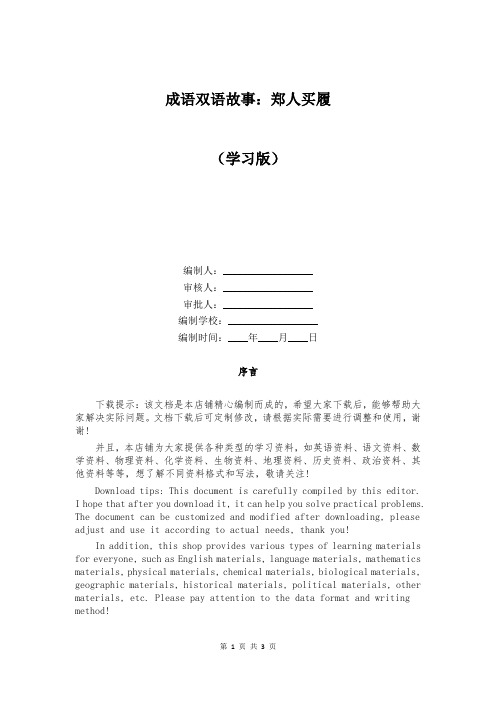
成语双语故事:郑人买履(学习版)编制人:__________________审核人:__________________审批人:__________________编制学校:__________________编制时间:____年____月____日序言下载提示:该文档是本店铺精心编制而成的,希望大家下载后,能够帮助大家解决实际问题。
文档下载后可定制修改,请根据实际需要进行调整和使用,谢谢!并且,本店铺为大家提供各种类型的学习资料,如英语资料、语文资料、数学资料、物理资料、化学资料、生物资料、地理资料、历史资料、政治资料、其他资料等等,想了解不同资料格式和写法,敬请关注!Download tips: This document is carefully compiled by this editor.I hope that after you download it, it can help you solve practical problems. The document can be customized and modified after downloading, please adjust and use it according to actual needs, thank you!In addition, this shop provides various types of learning materials for everyone, such as English materials, language materials, mathematics materials, physical materials, chemical materials, biological materials, geographic materials, historical materials, political materials, other materials, etc. Please pay attention to the data format and writing method!成语双语故事:郑人买履do sth by the book郑人买履A man of the state of Zheng wanted to buy a pair of shoes.从前,郑国有个人想买双鞋。
成语故事汉译英2
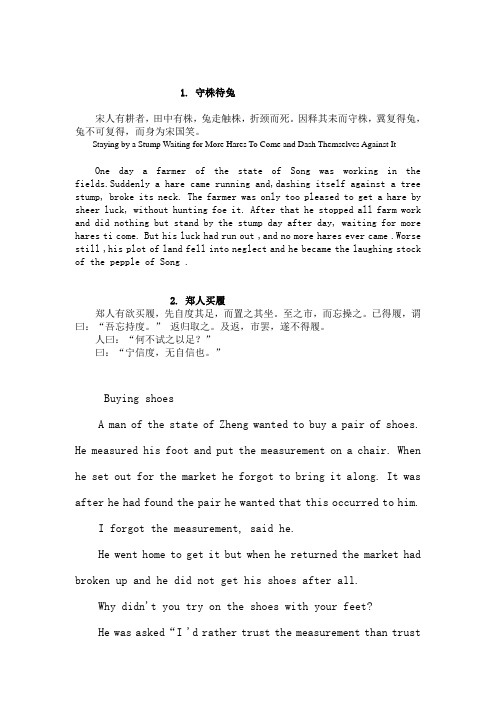
1. 守株待兔宋人有耕者,田中有株,兔走触株,折颈而死。
因释其耒而守株,冀复得兔,兔不可复得,而身为宋国笑。
Staying by a Stump Waiting for More Hares To Come and Dash Themselves Against ItOne day a farmer of the state of Song was working in the fields.Suddenly a hare came running and,dashing itself against a tree stump, broke its neck. The farmer was only too pleased to get a hare by sheer luck, without hunting foe it. After that he stopped all farm work and did nothing but stand by the stump day after day, waiting for more hares ti come. But his luck had run out ,and no more hares ever came .Worse still ,his plot of land fell into neglect and he became the laughing stock of the pepple of Song .2. 郑人买履郑人有欲买履,先自度其足,而置之其坐。
至之市,而忘操之。
已得履,谓曰:“吾忘持度。
” 返归取之。
及返,市罢,遂不得履。
人曰:“何不试之以足?”曰:“宁信度,无自信也。
”Buying shoesA man of the state of Zheng wanted to buy a pair of shoes. He measured his foot and put the measurement on a chair. When he set out for the market he forgot to bring it along. It was after he had found the pair he wanted that this occurred to him.I forgot the measurement, said he.He went home to get it but when he returned the market had broken up and he did not get his shoes after all.Why didn't you try on the shoes with your feet?He was asked“I 'd rather trust the measurement than trustmyself”也有一些恒星非常小,有的比地球还小。
郑人买履文言文及翻译

郑人买履文言文及翻译《郑人买履》这则故事故事中的人只相信量脚得到的尺码,而不相信自己的脚,不仅闹出了大笑话,连鞋子也买不到。
今天店铺要给大家介绍的便是郑人买履文言文及翻译,欢迎阅读!郑人买履文言文及翻译原文郑人有欲买履者,先自度其足,而置之其坐,至之市,而忘操之。
已得履,乃曰:“吾忘持度。
”反归取之。
及反,市罢,遂不得履。
人曰:“何不试之以足? ”曰:“宁信度,无自信也。
”译文有一个想要买鞋的郑国人,他先测量好自己脚的尺码,然后把尺码放在他的座位上。
等到了集市,他忘了带量好的尺码。
他已经挑好了鞋子,才说:“我忘记带量好的尺码了。
”返回家去取尺码。
等到他返回集市的时候,集市已经散了,于是他没有买到鞋。
有人问:“为什么不用你的脚去试试鞋的大小呢?” 他说:“我宁可相信量好的尺码,也不相信自己的脚。
”阅读题目18.解释文中加点的字。
(2分)1、___________________________2、____________________________3、____________________________4、____________________________19.翻译文中划线句子。
(4分)20.从文中找出郑人最可笑的言行。
(2分)____________________________21.从这篇寓言中你懂得了什么道理?(2分)____________________________22.这则寓言讽刺了什么样的人?(2分)阅读答案18.(2分)1、量长短 2、到……去 3、量好的尺码 4、同“返”,返回。
19.(4分)(1)为什么不用脚试一试鞋子的大小呢?(2)我宁可相信尺码,也不相信自己的脚。
20.(2分)宁信度,无自信也。
21.(2分)说明做事迷信教条而不顾客观实际,是不会成功的。
22、(2分)讽刺了因循守旧,固执己见,不知变通,不懂得根据客观实际,采取灵活对策的蠢人。
郑人买履文言文及翻译原文郑人有欲买履者,先自度(duó)其足,而置之其坐。
《郑人买履》文言文意思

《郑人买履》文言文意思《郑人买履》文言文意思郑人买履,既是一个成语,又是一个典故,更是一寓言,说的是郑国人因过于相信“尺度”,造成买不到鞋子的故事。
它告诉人们,遇事要实事求是,要会灵活变通,不要死守教条。
原文:郑人有欲买履者,先自度(duó)其足,而置之其坐。
至之市而忘操之。
已得履,乃曰:“吾忘持度(dù)。
”反归取之。
及反,市罢,遂(suì)不得履。
人曰:“何不试之以足?”曰:“宁(nìng)信度,无自信也。
”注释1.郑:春秋时代一个小国的名称,在现今河南省的新郑县。
2.欲:将要,想要。
3.者:......的人。
(定语后置)4.先:首先。
5.度(duó):测量。
6.而:连词,表示承接。
7.置:放置,搁在。
8.之:代词,代它,此处指量好的尺码。
9.其:他的。
10.坐:通假字,同“座”,座位。
11.至:等到,直到。
12.之:到……去,往13.操:携带。
14.已:已经。
15.得:得到;拿到。
16.履:鞋。
17.乃:于是,这才。
18.持:拿。
19.度(dù):量好的尺码。
20.反:通假字,同“返”,返回。
21.市罢:集市散了。
23.遂:于是。
24.曰:说。
25.宁(nìng):宁可。
26.无:不。
27.自信:相信自己。
28.以:用。
注意字词【读音】履:lǚ 边音,第三声【读音】度:duó 多音字,第二声【读音】宁:nìng 鼻音,第四声【读音】遂:suì 非常用生字,第四声译文有一个想要买鞋的郑国人,他先量好自己脚的.尺码,然后把量好的尺码放在他的座位上。
等到了集市,他忘了带量好的尺码。
他已经挑好了鞋子,才说:“我忘记带量好的尺码了。
”于是返回家去取尺码。
等到他返回集市的时候,集市已经散了,他最终没有买到鞋。
有人问:“为什么不用你的脚去试试鞋的大小呢?” 他说:“我宁可相信量好的尺码,也不相信自己的脚。
郑人买履文言文译文鉴赏
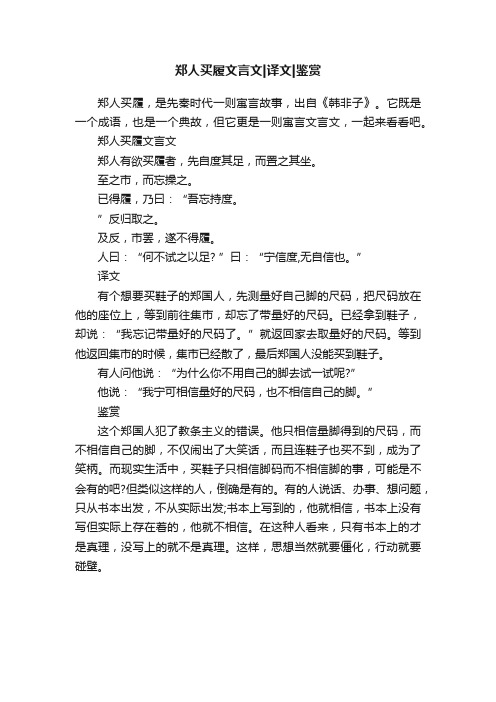
郑人买履文言文|译文|鉴赏
郑人买履,是先秦时代一则寓言故事,出自《韩非子》。
它既是一个成语,也是一个典故,但它更是一则寓言文言文,一起来看看吧。
郑人买履文言文
郑人有欲买履者,先自度其足,而置之其坐。
至之市,而忘操之。
已得履,乃曰:“吾忘持度。
”反归取之。
及反,市罢,遂不得履。
人曰:“何不试之以足? ”曰:“宁信度,无自信也。
”
译文
有个想要买鞋子的郑国人,先测量好自己脚的尺码,把尺码放在他的座位上,等到前往集市,却忘了带量好的尺码。
已经拿到鞋子,却说:“我忘记带量好的尺码了。
”就返回家去取量好的尺码。
等到他返回集市的时候,集市已经散了,最后郑国人没能买到鞋子。
有人问他说:“为什么你不用自己的脚去试一试呢?”
他说:“我宁可相信量好的尺码,也不相信自己的脚。
”
鉴赏
这个郑国人犯了教条主义的错误。
他只相信量脚得到的尺码,而不相信自己的脚,不仅闹出了大笑话,而且连鞋子也买不到,成为了笑柄。
而现实生活中,买鞋子只相信脚码而不相信脚的事,可能是不会有的吧?但类似这样的人,倒确是有的。
有的人说话、办事、想问题,只从书本出发,不从实际出发;书本上写到的,他就相信,书本上没有写但实际上存在着的,他就不相信。
在这种人看来,只有书本上的才是真理,没写上的就不是真理。
这样,思想当然就要僵化,行动就要碰壁。
郑人买履的意思
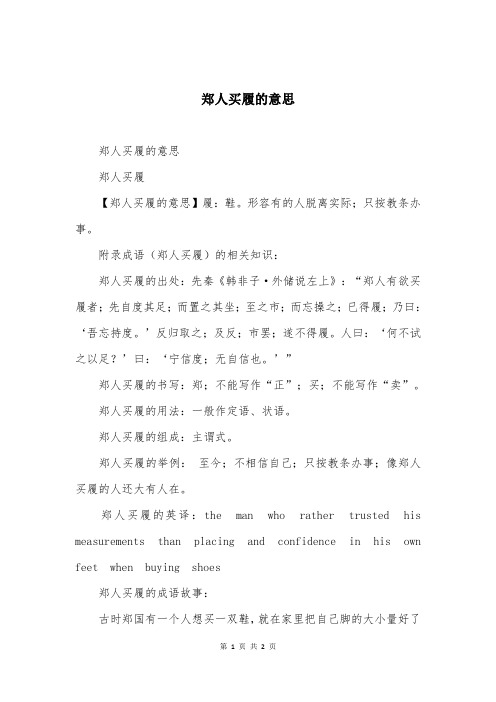
郑人买履的意思
郑人买履的意思
郑人买履
【郑人买履的意思】履:鞋。
形容有的人脱离实际;只按教条办事。
附录成语(郑人买履)的相关知识:
郑人买履的出处:先秦《韩非子·外储说左上》:“郑人有欲买履者;先自度其足;而置之其坐;至之市;而忘操之;已得履;乃曰:‘吾忘持度。
’反归取之;及反;市罢;遂不得履。
人曰:‘何不试之以足?’曰:‘宁信度;无自信也。
’”
郑人买履的书写:郑;不能写作“正”;买;不能写作“卖”。
郑人买履的用法:一般作定语、状语。
郑人买履的组成:主谓式。
郑人买履的举例:至今;不相信自己;只按教条办事;像郑人买履的人还大有人在。
郑人买履的英译:the man who rather trusted his measurements than placing and confidence in his own feet when buying shoes
郑人买履的成语故事:
古时郑国有一个人想买一双鞋,就在家里把自己脚的大小量好了
第 1 页共2 页
尺寸。
他来到了集市上卖鞋的店铺里,看好了一双鞋,正准备买的时候,忽然发现自己量好的尺寸放在家里忘了带来了,就说忘了带尺寸,回家拿来尺寸再买,所以就往回走,但集市已经关门。
旁边的人问他,你给自己买鞋,为什么不直接试试大小,非按原本的尺寸干啥?郑国的那人就说,我宁可相信我量的尺寸合适,脚却不一定准确。
第 2 页共2 页。
郑人买履英语故事

郑人买履英语故事这是一个关于郑人买履的英语故事,讲述了一个郑国人因为不量自己的脚而买了不合适的鞋子,最终通过智慧解决了问题。
下面是本店铺为大家精心编写的3篇《郑人买履英语故事》,供大家借鉴与参考,希望对大家有所帮助。
《郑人买履英语故事》篇1Once upon a time in ancient China, there was a man from Zheng who loved to buy new shoes. He would go to the market every week and browse through all the shoes on display, looking for the perfect pair.One day, the man decided to buy a pair of shoes that were very stylish but a bit expensive. He tried them on in the store and they fit perfectly. He was so happy with his purchase that he forgot to measure his feet before leaving the store.As he walked home, the man began to feel a pinching in his toes. He assumed that it was just because the shoes were new and that they would stretch with time. But as he continued to walk, the pain became more intense.When he finally arrived home, he took off his shoes and discovered that his feet were red and swollen. He was shocked to realize that the shoes were too small and had rubbed his feet raw.The man was disappointed and frustrated, but he didn"t want to waste the money he had spent on the shoes. He decided to use his ingenuity to solve the problem.He took a piece of paper and measured his footprint, then took the measurements to a cobbler. The cobbler used the measurements to make a pair of shoes that fit the man"s feet perfectly.The man was happy with his new shoes and wore them proudly every day. He learned from this experience to always measure his feet before buying shoes, no matter how stylish they might be.This story may seem simple, but it teaches a valuable lesson: always think before you act, and don"t be afraid to use your ingenuity to solve problems. Whether you"re buying shoes or facing a more complex challenge, it"s important to take the time to think things through and find a solution that works.《郑人买履英语故事》篇2The English story of "A Zheng Person Buying Shoes" goes as follows:There was a man from Zheng who needed to buy a new pair of shoes. He decided to measure his foot at home before going tothe market to ensure that he bought the right size. He used a piece of string to measure the length of his foot and then marked the measurement on the string.When he arrived at the market, he found a cobbler who had a pair of shoes that he thought would be perfect for him. However, he couldn"t remember the measurement of his foot, so he took out the string and measured his foot again. To his surprise, the measurement was different from the one he had marked on the string.Confused, the Zheng person asked the cobbler for advice. The cobbler said, "Why don"t you use your foot to measure the shoe? If it fits, it"s the right size." The Zheng person realized that he had been measuring his foot the wrong way all along. He thanked the cobbler for his advice and bought the shoes, which fit perfectly.This story is often used to illustrate the importance of thinking outside the box and not always relying on conventional methods to solve problems.《郑人买履英语故事》篇3The story of "Zheng Ren Bu Lv" is a well-known Chinese fable about a man from the state of Zheng who needed to buy a new pairof shoes. The man, who was very particular about fitting, decided to measure his foot at home before going to the market. However, he ended up forgetting the measurements and relied on the size of his old shoes to guide him.When the man arrived at the market, he found a cobbler who had a variety of shoes for sale. The man asked the cobbler if he had a pair of shoes that fit his foot size. The cobbler replied that he did not have any shoes in stock that would fit the man"s foot, but he could make a custom pair for him.The man was worried that the custom-made shoes would not fit properly, so he insisted on buying a pair of shoes that were already made. He found a pair of shoes that he thought would fit, but when he tried them on, he 发现他们太大了。
小古文—— 郑人买履
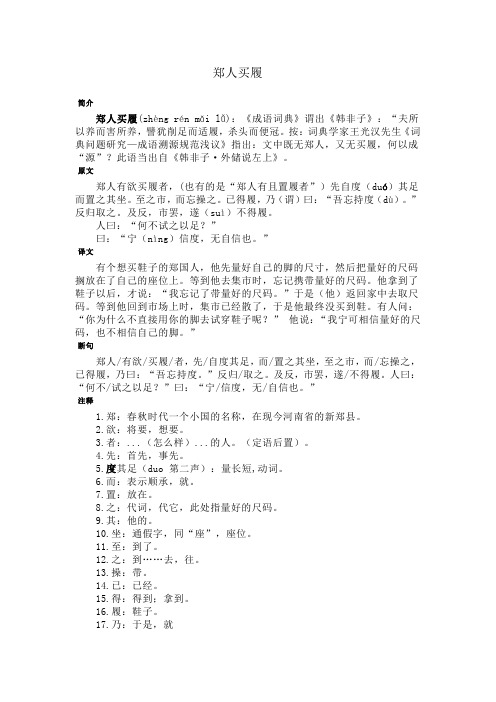
郑人买履简介郑人买履(zhèng rén mǎi lǚ):《成语词典》谓出《韩非子》:“夫所以养而害所养,譬犹削足而适履,杀头而便冠。
按:词典学家王光汉先生《词典问题研究—成语溯源规范浅议》指出:文中既无郑人,又无买履,何以成“源”?此语当出自《韩非子·外储说左上》。
原文郑人有欲买履者,(也有的是“郑人有且置履者”)先自度(duó)其足而置之其坐。
至之市,而忘操之。
已得履,乃(谓)曰:“吾忘持度(dù)。
”反归取之。
及反,市罢,遂(suì)不得履。
人曰:“何不试之以足?”曰:“宁(nìng)信度,无自信也。
”译文有个想买鞋子的郑国人,他先量好自己的脚的尺寸,然后把量好的尺码搁放在了自己的座位上。
等到他去集市时,忘记携带量好的尺码。
他拿到了鞋子以后,才说:“我忘记了带量好的尺码。
”于是(他)返回家中去取尺码。
等到他回到市场上时,集市已经散了,于是他最终没买到鞋。
有人问:“你为什么不直接用你的脚去试穿鞋子呢?” 他说:“我宁可相信量好的尺码,也不相信自己的脚。
”断句郑人/有欲/买履/者,先/自度其足,而/置之其坐,至之市,而/忘操之,已得履,乃曰:“吾忘持度。
”反归/取之。
及反,市罢,遂/不得履。
人曰:“何不/试之以足?”曰:“宁/信度,无/自信也。
”注释1.郑:春秋时代一个小国的名称,在现今河南省的新郑县。
2.欲:将要,想要。
3.者:...(怎么样)...的人。
(定语后置)。
4.先:首先,事先。
5.度其足(duo 第二声):量长短,动词。
6.而:表示顺承,就。
7.置:放在。
8.之:代词,代它,此处指量好的尺码。
9.其:他的。
10.坐:通假字,同“座”,座位。
11.至:到了。
12.之:到……去,往。
13.操:带。
14.已:已经。
15.得:得到;拿到。
16.履:鞋子。
17.乃:于是,就18.持:拿。
19.度(dù):量好的尺码。
- 1、下载文档前请自行甄别文档内容的完整性,平台不提供额外的编辑、内容补充、找答案等附加服务。
- 2、"仅部分预览"的文档,不可在线预览部分如存在完整性等问题,可反馈申请退款(可完整预览的文档不适用该条件!)。
- 3、如文档侵犯您的权益,请联系客服反馈,我们会尽快为您处理(人工客服工作时间:9:00-18:30)。
古文英译:郑人买履
大家好,本期我们将给大家带来寓言故事:《郑人买履》的英文翻译。
同时,在译文注释部分,我们将对翻译中的难点进行解释,希望对大家有所帮助。
原文:
郑人有欲买履者,先自度其足,而置之其坐。
至之市而忘操之。
已得履,乃曰:“吾忘持度!”反归取之。
及反,市罢,遂不得履。
人曰:“何不试之以足? ”
曰:“宁信度,无自信也。
”
汉语译文:
有一个郑国人想买鞋,他先量好自己的脚,然后把量好的尺码放在座位上。
到了集市上,却忘了带上尺码。
他挑好了鞋,对卖鞋的人说:“我忘了带尺码。
”于是就回家去取。
等他返回时,集市已经散了,他最终没有买到鞋子。
有人问:“你为什么不用自己的脚去试鞋呢?”
他说:“我宁可相信量好的尺码,也不相信自己的脚。
”
英语译文:
A Man from the State of Zheng Bought Shoes
A man from the State of Zheng wanted to buy himself a pair of shoes. He measured his feet and put the measurement on the seat. Then he went to the market. When he selected a pair of shoes that was to his liking, he found that he had left the measurement at home. “Sorry, I forget to bring the measurement here,” he said to the salesperson, and hurried back home for the measurement. But when he returned to the market, it had closed.
Someone asked him, “Why don’t you try the shoes on to see if they fit well?”
He replied, “I trust the measurement of my feet rather than my feet.’’
英语译文注释:
1.“吾忘持度”的意思是“我忘了带尺码”,这里的“带”应该理解为“带来、拿来”,应选用bring,指从别处把某物带到说话人所在之处。
这里不能用take,它的意思是“带去,拿去”指从说话人所在之处把某物带走,与bring 的方向正相反。
2. “何不试之以足? ”的意思是:“你为什么不用自己的脚去试鞋呢?”在英译文中添加了目的状语to see if they fit well 使英语句子的意思更加完整。
